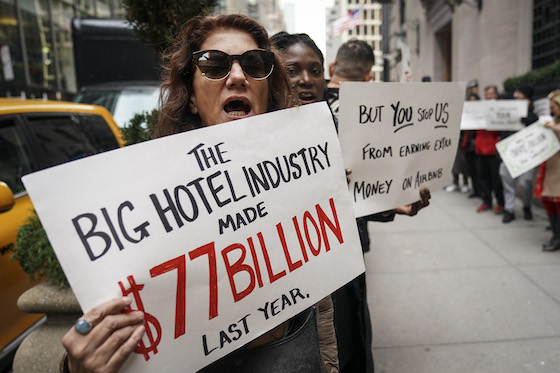Political leaders in New York are vowing to defend a new law that regulates home-sharing sites but may have to bend to allay concerns about government overreaching.
The sites, including Airbnb and HomeAway, won a victory in New York City last week when a federal judge blocked a new law requiring them to turn over detailed data on their listings.

U.S. District Judge Paul Engelmayer sided with the home-sharing sites’ request for a preliminary injunction to stop the law from going into effect in February. Engelmayer wrote that the city ordinance violates the constitutional ban on unreasonable search and seizure and said the companies were likely to prevail in their argument.
“We are still evaluating next steps and it is too early to spell them out,” said Vijay Dandapani, president and CEO of the Hotel Association of New York City. “Suffice to say the city intends to litigate and defend the lawsuit, taking note of the judge’s concerns.”
Dandapani is a strident critic of home-sharing sites: “The platforms are mostly scofflaws,” he told HOTELS. “As for the city law, we certainly champion it and look forward to the regulators fixing it to meet the concerns raised in court.”
An established state law bans rentals for less than 30 days unless a permanent resident remains in the apartment. Critics complain the short-term rentals contribute to high housing costs and overcrowding. Hotels have argued that home-sharing services aren’t subject to the same inspections and regulations with which they must comply. The New York City Council during the summer enacted an ordinance requiring the services to disclose detailed information about their listings, including the identity and addresses of hosts.
Related: NYC’s ‘ReformBNB’ takes global aim at home-sharing
Airbnb and HomeAway sought a preliminary injunction, arguing that the city law was unconstitutional, and the judge agreed. “The city has not cited any decision suggesting that the government appropriation of private business records on such a scale, unsupported by individualized suspicion or any tailored justification, qualifies as reasonable search and seizure,” Engelmayer wrote. The injunction blocks the law from taking effect while the underlying litigation proceeds.
“The decision is a huge win for Airbnb and its users, including the thousands of New Yorkers at risk of illegal surveillance who use Airbnb to help make ends meet,” an Airbnb representative said. “The court recognized the fundamental importance of New Yorkers’ constitutional rights to privacy and the sanctity of their own homes.”
Airbnb has said it wants to negotiate a compromise so that responsible New Yorkers can rely on home sharing to earn money while taking decisive action against bad actors operating illegal hotels. The San Francisco company said it supports limited home sharing in New York City to one home listing per host, and creating a registration system for hosts with a fee to support enforcement.
For his part, New York Mayor Bill de Blasio defended the law and predicted that the city would prevail. “We have a huge city with a lot of Airbnb activity and a lot of concern in our neighborhoods and unfortunately a lot of examples of abuse,” de Blasio said at a news conference last week. “And to put a strong data regimen in place made all the sense in the world.”
